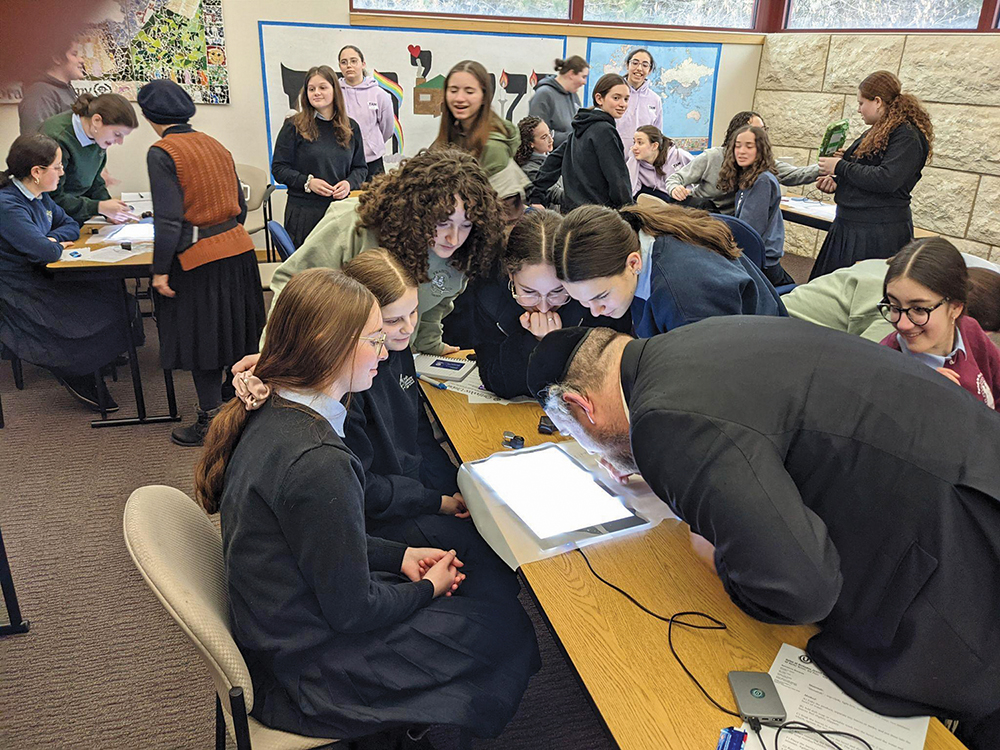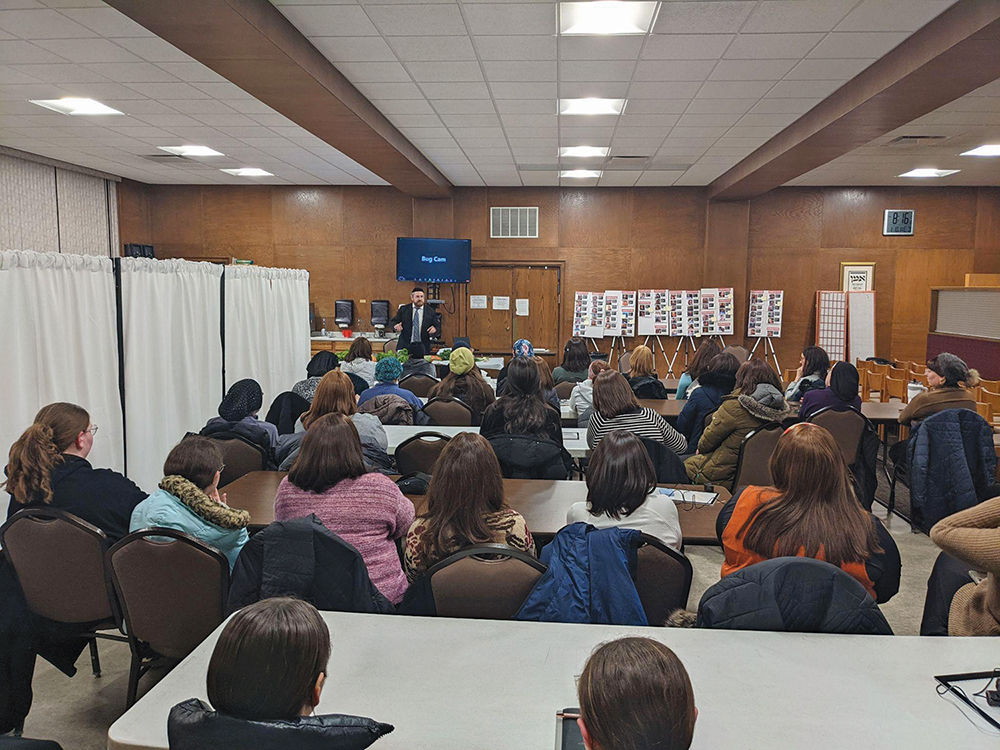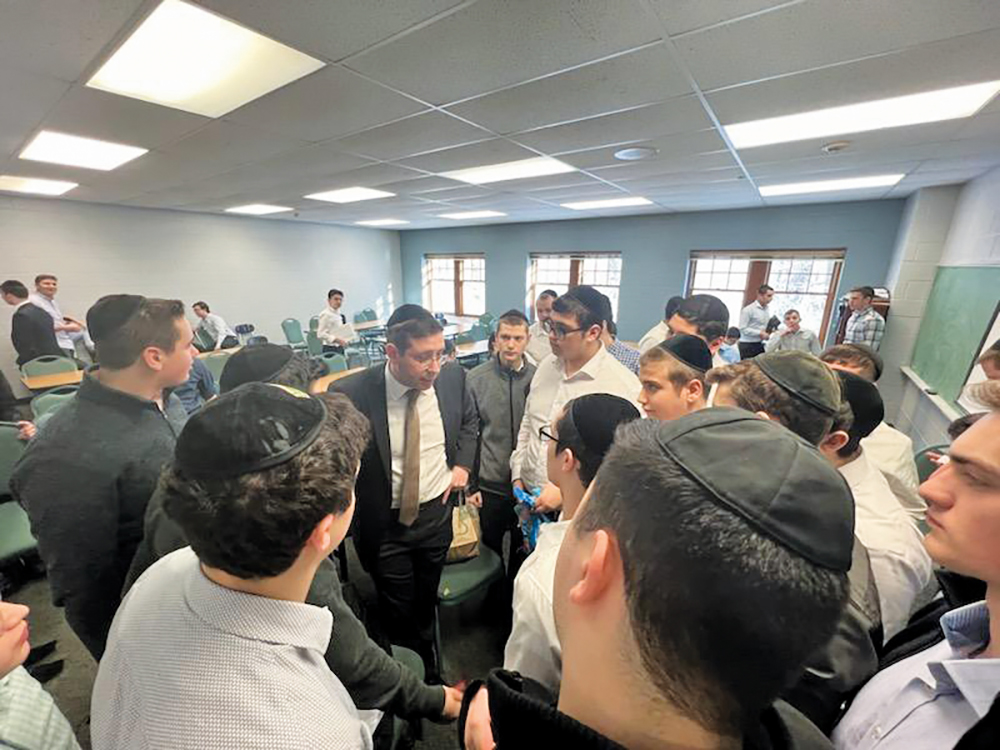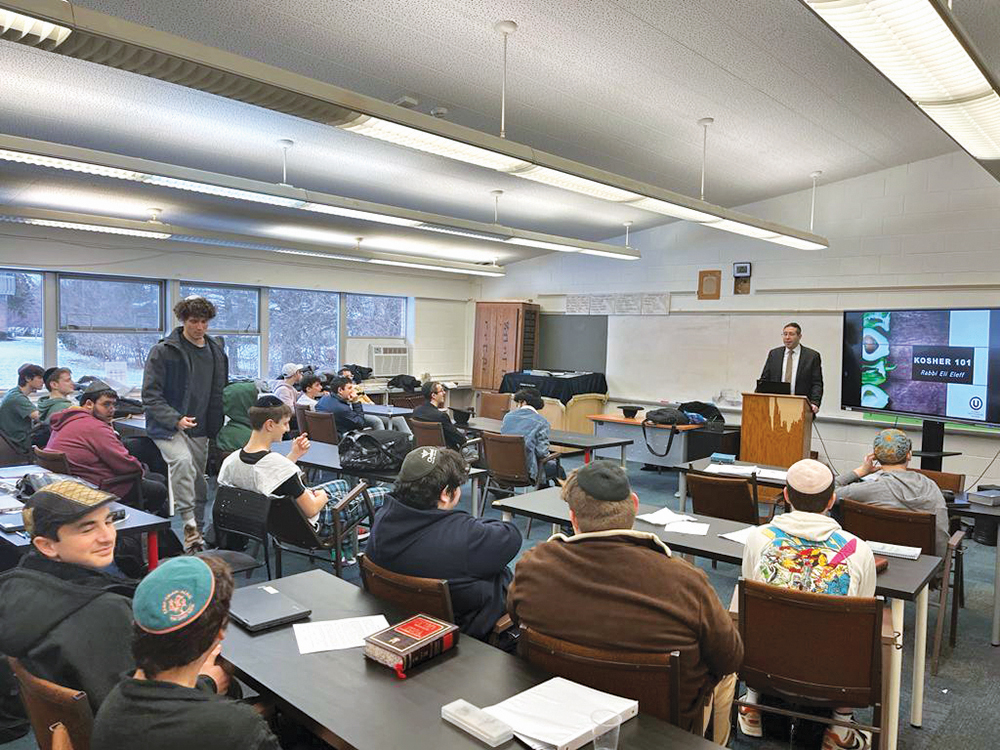ASK OU’s ‘Kashrus Across America’ program is tailored to meet communities’ needs and interests.

(Courtesy of OU) From food and restaurants to hotels and simcha venues, North American kosher consumers have an array of products and establishments at their disposal. While it’s exciting to see the OU symbol on products such as Oreos, Entenmann’s, Green Mountain Coffee and Fruity Cheerios, it’s rare to consider the behind-the-scenes efforts devoted to kashrus certification.
OU Kosher, the world’s largest and most widely recognized international kosher certification agency, is on a mission to make consumers more aware of the inner workings of the kashrus certification process through its expanded “Kashrus Across America” program, an ASK (Advanced Seminars in Kashrus) OU educational program initiative.
“As American entrepreneur and philanthropist Sy Syms used to say, ‘an educated consumer is our best customer,’” said OU Kosher Chief Operating Officer Rabbi Moshe Elefant.
OU Kosher Managing Director of Community Relations Rabbi Eli Eleff explained: “People are better equipped at keeping kosher once they are aware of what they need to know about it and understand the work involved in kosher certification. Consumers see kosher products on the shelves, but they don’t know what it takes to get them there.”
OU Kosher certifies over one million products manufactured in 13,000 plants in 105 countries. The organization certifies two-thirds of all kosher food in the United States. For over 30 years, OU Kosher has delivered educational programming to community shuls and organizations across North America, including Houston, Pittsburgh, Cleveland, New York, Montreal and Toronto.
“As the OU, our responsibility is not just to give hashgacha, but also to promote kashrus knowledge so that people understand what the standards and halachos are, and what we do,” said OU Kosher Chief Executive Officer Rabbi Menachem Genack, who launched ASK OU all those decades ago.

Then run by OU Kosher Senior Rabbinic Coordinator and Kosher Education Department Director Rabbi Yosef Grossman z”l, the program was initially marketed to rabbanim and men learning in kollel. It centered on shiurim and visits to manufacturing plants and restaurants where program participants could observe kosher certification’s practical implementation.
“About 50 people would attend at a time, and we never had enough room,” recalled Rabbi Genack. If you didn’t sign up early, you didn’t get a spot. Today, Rabbi Eleff has done a wonderful job of expanding the program by bringing it to many different cities and communities.”
In building upon its comprehensive services, ASK OU offers engaging presentations, seminars and workshops to yeshivas, girls’ schools, Jewish day schools and universities, while continuing its collaboration with shuls, kollels and nonprofits like local kashrus councils.
Partnering with other organizations, said Rabbi Eleff, enables everyone to share perspectives and learn from one another. “Our goal is to serve consumers across North America by providing them with resources, knowledge and skills, and making kashrus relevant and tangible to as many people as possible.”
Rabbi Eleff noted that communities’ needs and interests around kashrus education vary across regions.
The program’s versatility enables each community to select topics from a sample list, or suggest its own. Popular sessions include “Kosher 101,” “Red-Flag Ingredients,” “Kosher Wine Production,” “Kashering,” “Preparing for Pesach,” “Checking for Insects,” “Kosher Birds of the Wild,” “Kashrus of Fish” and “Alcoholic Beverages.”

In December, ASK OU presented two fascinating programs in Los Angeles and Philadelphia. The LA program, which attracted 100 participants, was hosted by the Valley Village Community Kollel and Congregation Bais Tefillah and featured OU Kosher Rabbinic Coordinator and Director of Food Services Rabbi Dov Schreier.
Rabbi Schreier’s presentation, “The ABC’s of Eating Out: Everything You Need to Know About Eating Out at a Restaurant, Event or on the Road,” explored the intricacies and halachos of kashrus as they apply to eating outside of the home. Rabbi Eleff followed with a lively Q&A session.
The Philadelphia event, “Beyond the Grapevine: A Journey Into Kosher Wine, Its Production and Relevant Halachos,” was hosted at Congregation Ahavas Torah by Kollel Mechanchim of Northeast Philadelphia in conjunction with OU Kosher. Participants also included two other kollels: the Northeast Philadelphia Community Kollel and the Philadelphia Community Kollel of Lower Merion. OU Senior Rabbinic Coordinator and wine department head Rabbi Nochum Rabinowitz presented on the practical considerations and basic halachos of kosher wine creation. OU Kosher Rabbinic Coordinator and Safra D’dayna Rabbi Eli Gersten then gave a shiur on the more complicated halachos and brachos related to grapes and wine.
Most recently, ASK OU’s Milwaukee program, “An Evening of Kashrus Inspiration,” was a tremendous hit among participants. At a packed Congregation Beth Jehudah (CBJ), attendees learned about bedikas tolayim (checking for insect infestation) from OU Rabbinic Coordinator Rabbi Daniel Sharratt and Rabbi Eleff. The rabbis also presented “Kosher 101” and insect infestation sessions at select local schools.
Rabbi Yosef Schlussel, an assistant to CBJ’s Rabbi Michael Twerski and Halacha teacher at Torah Academy of Milwaukee (TAM), was inspired by what he learned from the program.
“The presentations were overwhelmingly received with great enthusiasm,” he said. “They were clear, interesting and informative. Knowing about kashrus just by seeing a kashrus symbol, versus learning about the background and intricacies of what goes into the process, is much different and enhances our appreciation. Learning the practicality of checking for insects and gaining insight into what constitutes a chumra, what is necessary, and what amounts to misinformation, was great. We thank Rabbis Eleff and Sharratt for their time and expertise and we are indebted to the OU for making such a great program available.”
Tzvi Aryeh Markowitz, a senior at the Harri Hoffmann Family High School of Yeshivas Ohr Yechezkel/Wisconsin Institute for Torah Study (WITS), came away with valuable lessons from ASK OU’s presentation at his yeshiva.
“I’ve heard presentations from the OU before and they are always very informative and engaging,” he said. “This time was no different, especially with the humorous stories and breadth of knowledge. In particular, I was unaware of the need to confirm that a Slurpee or similar drink actually contains the alleged contents. I also enjoyed learning about some of the likely problems with commercial kashrus that necessitate competent mashgichim.”
According to Rabbi Elefant, the large-scale attendance of ASK OU programs coupled with participants’ overwhelmingly positive feedback highlight the need for this kind of programming in both large and small communities.
“From students to teachers to rabbanim to balabatim, participants have expressed their tremendous appreciation for ASK OU. The lessons we teach resonate with the audience; they realize how important kosher is to our Jewish lifestyle and become motivated to observe kashrus to the highest standards of halacha. We want to teach anyone who is interested in learning about kosher.”
Rabbi Eleff said the biggest misconception about OU Kosher is the belief that the certification process is seamless. Part of OU Kosher’s efforts are to add a human element to the kashrus process.

“We want people to know that we’re here for them. We have full-time rabbanim answering emails and our hotline, who have been hired to take care of the klal’s needs. We want people to be connected with both kashrus and the OU and to reach out to us. We are here to answer their questions at length, whether over the phone, via our programming or sending a scholar-in-residence to their community over Shabbos. Our hotlines are a free community service and many of the programs are highly subsidized by the OU.”
ASK OU’s upcoming “Education Across America” itinerary over the next few months includes events in Phoenix; New York, New Jersey, California and Denver; as well as two comprehensive men’s programs this summer.
“Right now we’re focusing on North America,” said Rabbi Eleff, “But we hope to have programs in Israel in the future. We’re an international organization and we want to be there for all of our constituents.”
For more information and to schedule an ASK OU presentation, seminar or workshop in your community, please contact OU Managing Director, Community Relations Rabbi Eli Eleff at 212-613-0602 or koshereducation@ou.org.








